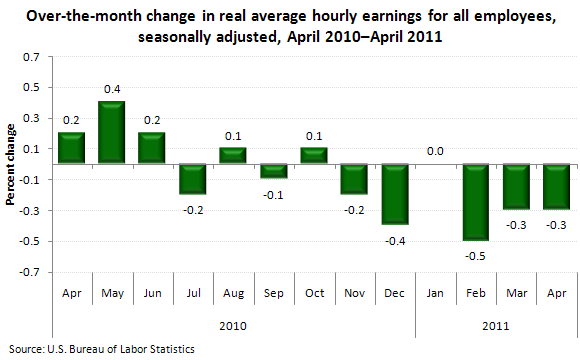Real Earnings Decline in April
Unless you got a raise last month, your paycheck didn’t quite as far as it did the month before. Though the U.S. Federal Reserve has dismissed a recent rise in the consumer price index as due to “transitory” spikes in commodity prices that will eventually correct itself, real average hourly earnings for all employees declined 0.3 percent from March to April, seasonally adjusted. This decrease stemmed from a 0.1-percent increase in average hourly earnings, which was more than offset by a 0.4-percent increase in the Consumer Price Index for All Urban Consumers (CPI-U).
Similarly, real average weekly earnings declined 0.3 percent over the month, as a result of the decrease in real average hourly earnings combined with the average workweek remaining unchanged. Since reaching a recent peak in October 2010, real average weekly earnings have fallen by 1.7 percent.
Even as American have been working more hours – there was a 0.6 percent increase in average weekly hours over the year from April, 2010 to April, 2011 – real earning have dropped. Over the year, real average hourly earnings fell by 1.2 percent, seasonally adjusted. This, combined with the longer average work week led to a net decrease in real average weekly earnings of 0.6 percent.
Hopefully, we’ll soon be past these “transitory” commodity price hikes, and as gas and food prices stabilize real earnings will go up.


